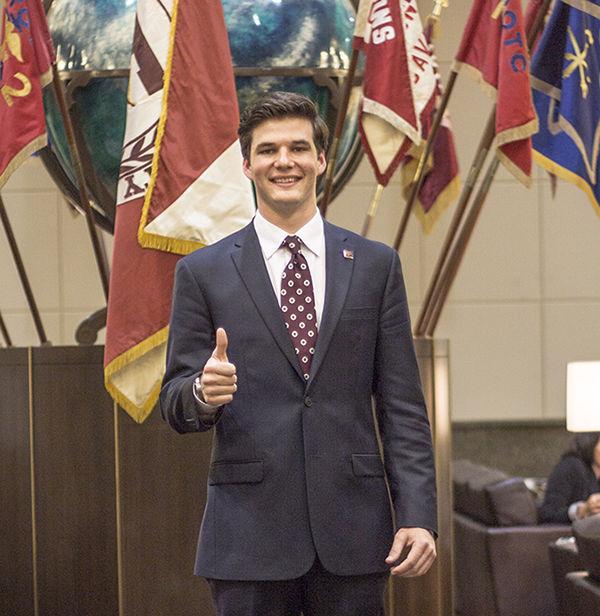As the Student Government Association Judicial Court deliberates a case to decide the student body presidency, further allegations of coercion and political favors have arisen.
SBP-elect Joseph Benigno alleges runner-up Michael Murtha breached the Aggie Honor Code in offering cabinet positions to the third-place candidate, Isaiah Tsau. And after a meeting between the two, Murtha alleges Benigno used the information to threaten him against further pursuing the J-Court case that could result in Benigno’s disqualification.
The allegations stem from conversations Murtha had with Tsau regarding the position of executive vice president.
Murtha said he and Tsau have met since November to discuss campaign similarities and platforms. They met again on the evening of Feb. 15, this time accompanied by a supporter of Murtha’s and members of Tsau’s campaign team.
“As time went on in the campaign, I did have a conversation with [Tsau] and some of his campaign team members that the best thing to do may be to work together to make sure that all diverse students of all different backgrounds receive the same voice they deserve,” Murtha said.
It was during this conversation Tsau said he was offered a cabinet position in Murtha’s administration.
“[Murtha] came to speak to my team and he promised — explicitly stated — if we backed out of the race, endorsed him as our candidate and got my entire committee behind him during the debate, he would have given me the executive vice president position,” Tsau said. “He told us it was the second-most powerful student position here at Texas A&M and I would have three cabinet positions for my choosing, so that would be a total of four positions.”
Murtha said this was a friendly conversation, telling Tsau a position would always be available for him, whether he withdrew his candidacy or not. Murtha said such offers are commonplace and occur almost annually.
“I have talked to [Tsau] about EVP, and I have no issue with that,” Murtha said. “There’s nothing ever stated that I can’t do that.”
Tsau went on to decline the offer, and brought the situation to Benigno, who was announced as student body president-elect after the Feb. 19-20 election.
On Feb. 23, Benigno then met with Murtha at a restaurant. Benigno said he met with Murtha to give him a chance to address the issue.
“I told him I knew exactly what he had done and that Isaiah and I were both willing to talk about it,” Benigno said. “I said if he continued to pursue the office of student body president, that the both of us would find that information relevant to the student body.”
Murtha said he felt the conversation was threatening, and saw it as blackmail.
“He proceeded to talk about how this was going to hurt my career in SGA, my career going into law school, my character — just all kinds of things, and tried to threaten me not to take [the J-court case],” Murtha said.
Murtha said the meeting is proof Benigno committed campaign violations.
“It proves to me that he knows they did wrong things and they wanted to prevent the J-Court case from happening,” Murtha said.
Murtha recorded the Feb. 23 meeting and provided the audio file to The Battalion. In the exchange, Benigno said he would only bring the cabinet offer to light if Murtha continued his SBP pursuit through J-Court.
“I’m not going to drag you through the mud unnecessarily and I don’t think it’s relevant unless you hold office,” Benigno said in the recording.
Benigno said he has since reviewed the recording and could find nothing that could be construed as a threat.
“I think it’s comical and ludicrous that he feels or felt threatened by that conversation,” Benigno said. “I maintain my innocence and I urge anyone who might feel that I acted in the wrong to read the transcript or listen to the audio because I don’t think anyone that reads those things could reasonably find me at fault.”
Benigno said he originally intended not to pursue the matter.
“But when I read that [Murtha’s offer] was an honor violation that skipped the Election Commission, J-Court and SGA internal regulations and goes to honor council, I realized it was a bigger issue than just an election violation,” Benigno said.
Benigno cited section six of election regulations, which states: “The Election Commission shall make every attempt to conduct voting in a way free from coercion or pressure. Those obstructing the free and fair nature of the voting process, by which voters may cast a ballot by free choice, are in violation of these regulations and the Aggie Honor Code and they shall be reported to the Aggie Honor System Office for possible reprimand.”
If any party decides to submit a Student Conduct Code violation against another, potential penalties vary based on severity and range from correctional workshops to expulsion.
Associate director in the Department of Student Life Kristen Harrell said cases involving the Student Conduct Code are typically assigned to a student conduct code officer, who then determines whether there is significant evidence of policy violation. From there, cases are split into two categories based on whether they could end in expulsion.
Major cases are brought before a three-person panel. Opposing parties could be heard together or separately, depending on the nature and similarity of the claims.
The pending J-Court ruling, for an appeal in which Murtha argues Benigno should have been fined for rule violations in a campaign video, is expected within 72 hours of Monday’s hearing.
Allegations arise among SBP candidates of threats, political favors
March 4, 2015
0
Donate to The Battalion
$1815
$5000
Contributed
Our Goal
Your donation will support the student journalists of Texas A&M University - College Station. Your contribution will allow us to purchase equipment and cover our annual website hosting costs, in addition to paying freelance staffers for their work, travel costs for coverage and more!
More to Discover










